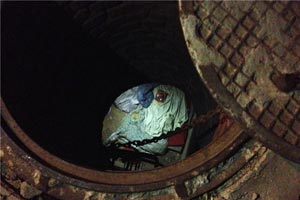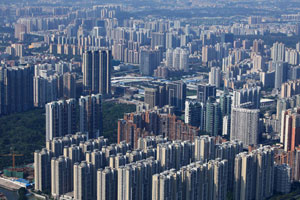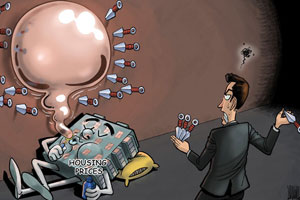BEIJING - Zig-zagging left and right through a maze of dark, narrow corridors in a high-rise's basement, 35-year-old kitchen worker Hu has joined the many thousands of Chinese fleeing fast-rising property prices by heading down - down underground.
Hu lives here beneath an affluent downtown apartment building, in a windowless, 4 square-meter (43 square-foot) apartment with his wife. For 400 yuan ($65.85) a month in rent, there's no air-conditioning, the only suggestion of heat is a pipe snaking through to deliver gas to the apartments above and the bathroom is a fetid, shared toilet down the hall.
"I can't afford to rent a house," said Hu as he showed off his meager appointments. Living in basement apartments isn't illegal in China, but like anywhere else it is nothing to brag about and Hu, who guts fish for 2,500 yuan a month at a popular Sichuanese hotpot restaurant on the street above, declined to provide his given name. "If I weren't trying to save money, I wouldn't live here," he said.
Locals have dubbed Hu and his fellow subterranean denizens the "rat race" - casualties and simultaneously emblems of a housing market beyond the government's control.
Despite efforts to discourage property speculation and develop affordable housing, a steady stream of job-seekers from the countryside and a lack of attractive investment alternatives have kept prices soaring. Residential property prices rose 10 percent in November from the same month of 2012, according to data released last week, and have been setting new records every year since 2009. Prices in Beijing are rising even faster - 16 percent a year - with rents climbing 12 percent a year.
Lovely sewer, close to manholes
That's pushing more and more newly arrived urbanites underground. Of the estimated 7.7 million migrants living in Beijing, nearly a fifth live either at their workplace or underground, according to news agency Xinhua. Beijing's housing authority refuted this statistic, saying in an email to Reuters that a government survey last year found only about 280,000 migrants living in basements and that only a small percentage of Beijing's basements were being used as dwellings.
Last month, authorities sealed Beijing's manhole covers after local media discovered a group of people living in the sewers below, with one, a 52-year-old car washer, reported by the local media to have been living there for at least a decade. The sewer dwellers were relocated and those not from Beijing sent back home.
Rising prices are putting home ownership farther out of reach for most Chinese, worsening the gap between rich and poor and breeding social discontent.
"Some people can buy several homes, some people can't even buy one," said Mao Yushi, co-founder and honorary president at the Unirule Institute of Economics, an independent think tank in Beijing. "There will be an impact on society."
The government has responded by restricting home purchases and boosting the supply of low-cost public housing. In Beijing, the total floor space of public housing rose 20 percent in the first 11 months of 2013 from the year before.
But with the promise of employment and education beckoning in big cities like Beijing and Shanghai, the problem appears likely to only get worse. Beijing saw another 316,000 migrants arrive in 2012, lifting its population to 19.6 million.
|
Relatedcoverage: |
||
|
|
||
|
 |
 |
 |
| Secondhand housing market sees chill in Dec |
|
|
|
|
|
|
|
|